A crucial set of principles for advancing sustainable living and establishing an efficient waste management system. The Three R's work together to reduce material usage, reuse materials, and recycle whenever possible.
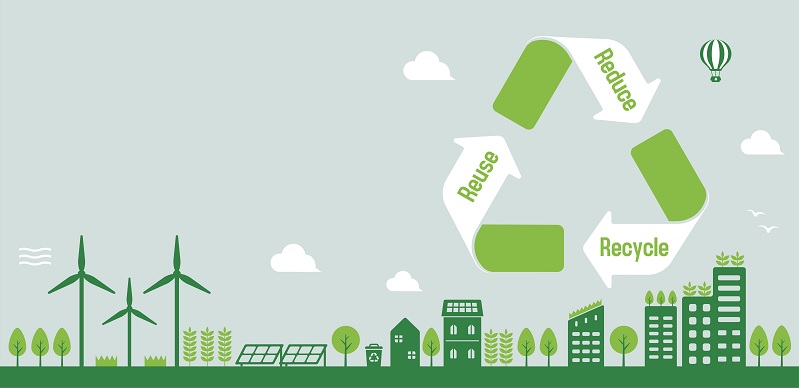
What are the Three R's?
The three R’s are a condensed version of the 5-step Waste Hierarchy, incorporating the most significant methods in a prioritized sequence. Reduce. Reuse. Recycle.
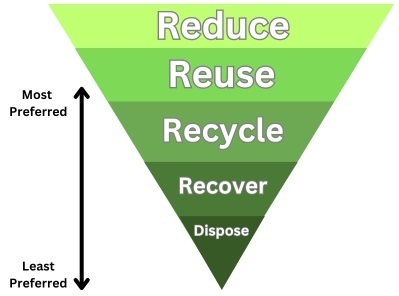
These practices are essential for achieving a more sustainable and environmentally friendly society.
Why Should We Reduce, Reuse and Recycle?
While environmental preservation is the primary focus of the three R's, it should also be noted that they bring about valuable economic and social advantages.
Environmental Benefits: The environmental benefits of the three R's are far-reaching, encompassing the conservation of natural resources, reduction of greenhouse gas emissions, protection of ecosystems and biodiversity, and a general reduction in the negative environmental impacts associated with waste generation and disposal.
Economic Benefits: There is a clear correlation between cost savings and reduced expenses when it comes to the three R's. By decreasing the amount of new purchases and reutilizing existing items - individuals, businesses, and communities can all achieve financial savings. Moreover, the growth of the recycling industry can also create jobs.
Social Benefits: Embracing the three R's often involves local communities, workplaces and families working together. What’s more, the sense of duty can motivate individuals to take action and contribute to a more sustainable future in their day-to-day lives.
How to Use the Three R’s
In the following section, we will evaluate the significance of each step and explore techniques for incorporating them into your daily routine, whether you are an individual or a business..

The impact on the environment is influenced by everything we produce and consume. The initial step to address this is to decrease waste production, as it addresses the problem at the source. By producing less waste, there is less to clean up, making it the most impactful of the three R's.
Learning to Reduce
Eco-Friendly Shopping:
When grocery shopping, actively choose the items that use the least amount of packaging and avoid using store-provided plastic bags. In addition, many grocery stores now provide refillable options on dry goods such as pasta and cereals; and household care products such as dish soap and shampoo.
Avoid Single-Use Items:
Swap out the disposable for the reusable and replace everyday things with alternatives that won’t go to waste. For instance, using ceramic coffee cups instead of single-use coffee cups, opting for glass bottles instead of plastic ones, and choosing eco-friendly bags made from natural fibers rather than plastic bags.
Reduce paper usage:
Make two-sided copies whenever possible or opt for electronic mail or a bulletin board instead of using multiple sheets of paper.

When considering discarding an item, consider its potential for being used again. It could still have a purpose or be valuable in a different way. This not only benefits the environment but can also be financially wise if you opt to sell it. Keep in mind that just because you no longer find something useful, doesn't mean someone else won't find it necessary.
Learning to Reuse
Buy Durable Goods:
Purchase items that are well-built or that carry good warranties to ensure you don't have to buy a replacement. They will last longer so you can consistently use them, saving money in the long run and reducing landfill space.
Sell or Donate:
If you don’t need something anymore, make sure someone else can benefit from it. You can sell almost anything second-hand, from clothes to appliances and even furniture.
Mend and Repair:
Instead of discarding items like electricals, textiles, and mechanical goods for minor defects, repair them! This can also be a cost-effective solution, as it eliminates the need to buy a completely new item.

While recycling should be seen as a last option, it by no means holds less significance compared to the other two. Converting discarded items into new products to prevent the depletion of natural resources is crucial. When an item has reached its end of life and cannot be used any longer, make sure that the materials are repurposed into something new.
Learning to Recycle
Start a recycling programme:
An effective system for recycling can go a long way, particularly in the workplace. This involves educating colleagues on proper waste disposal methods and the types of materials that the company recycles.
Ensure correct disposal:
In order for recycling to be successful, it is crucial to have the proper tools. This includes strategically placing designated recycling bins in the correct locations to cater to their maximum usage.
Check collection centres:
See what waste collection services are available in your area so you know what can and can’t be accepted for recycling.
At Glasdon, we offer a range of Recycling Containers designed to facilitate efficient indoor and outdoor recycling programmes. Our collection encompasses a variety of materials, styles, and capacities to cater to the specific needs of your organization.
|
Nexus® Transform |
Nexus® Stack |
Glasdon Jubilee™ |
Nexus® City |
||||
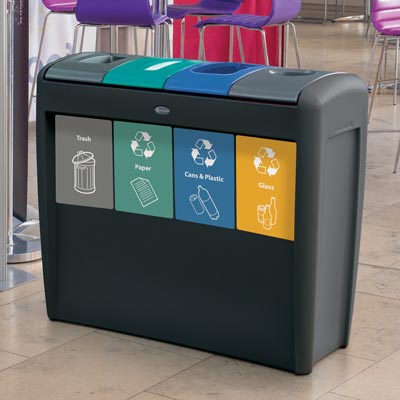 |
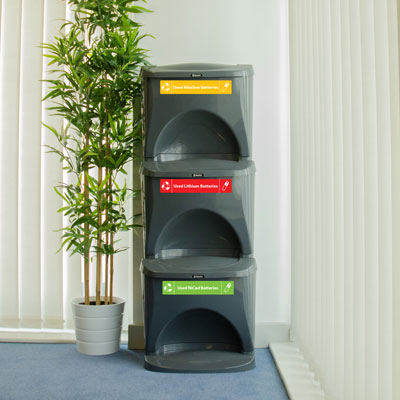 |
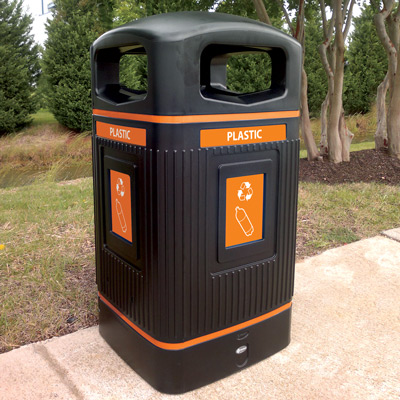 |
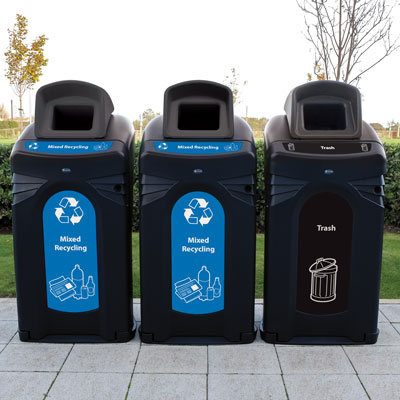 |
||||
|
Learn more |
Learn more |
Learn more |
Learn more |
By following the three R's, individuals, organizations and communities can ultimately contribute to a more sustainable and environmentally responsible approach to waste management.
After analyzing each principle and offering suggestions for implementation, see how you can incorporate them into your daily routine.
If you require more information on any of the topics discussed, please Contact Us and talk to our team of specialists today.




